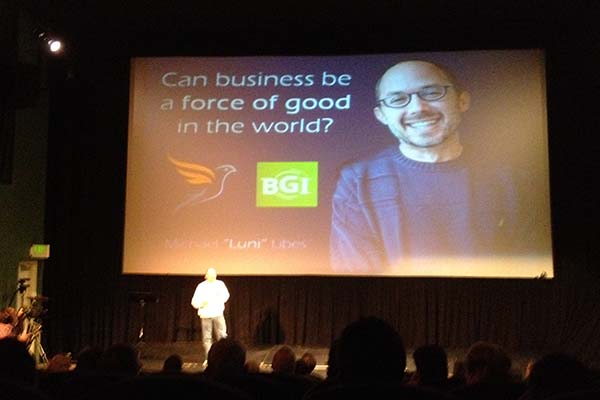
Practice makes better. The Ignite format looks simple, 20 slides, auto-forwarding every 15 seconds, making for an exactly 5 minute talk. Hitting the timing of the slide transitions comes down to two strategies. Either practice, practice, and practice, not skipping or adding any words to the script, or don’t even try, making the slides pure images that don’t need to be in sync with the story.
Below is my second Ignite talk, this one at the second-annual Ignite Bainbridge, a local gathering of my neighbors from Bainbridge Island, Washington. If you’ve not been, we are a suburb of Seattle, just across Puget Sound by ferry, but with some of the less stressful island vibe. Most of us are over here to raise kids, most of the rest here to retire.
In any case, this talk answers the question of the true purpose of business.
Do note that the very opening was cut off, and that as soon as the Walmart picture appeared, the audience started laughing. Bainbridge Island is the type of town that has protests when someone wanted to open a Subway sandwhich shop, and when Starbucks wanted to open a to-go bar inside Safeway.
Transcript:
Welcome to Bainbridge Island. A community with no Walmart. A community that wants no Walmarts. A community that despises Walmart. <pause> Why?
My name is Luni. I am the Entrepreneur in Residence for the Bainbridge Graduate Institute. I am the founder and Managing Director of Fledge, the “conscious” company incubator. And tonight I’m here to answer the question of whether business is and can be a force of good in the world.
To answer this question, let’s step back to the beginning of the 20th Century. Here in the U.S., the per-capita GDP was just $5,000 (in today’s dollars), and 40% of American’s lived in poverty. In comparison, these are both worse off then China today.
In terms of technology, less than 5% of homes had electricity. Less than 5% had a telephone. Few homes had running water, central heat, and so on… So how in just over a century did this country become the rich, developed world we all take for granted today?
It wasn’t a new form of government. It wasn’t foreign aid from Europe. It was capitalism. Business. Electrification from GE. Telephones from AT&T. Cars from Ford. Computers from IBM. Smartphones from Apple.
So if business did all that good, why do we vilify businesses like Walmart? Are we so rich now that we no longer need business, or is there something that Walmart and other companies are lacking?
Absolutely! The answer is “purpose”. <pause>. A purpose for being that goes beyond maximizing profits. A purpose that improves the world… by the existence of the business. A business that purposefully makes the world a better place, by being IN business.
But wait… we’re told on CNBC, in the New York Times, in the Wall Street Journal, by the Chairman of the Fed, by Harvard Business School, and so on that the purpose of business is to MAXIMIZE SHAREHOLDER VALUE. That all other use of funds by a business are stealing from shareholders. If this is true, then how can a business be good?
Well… That definition is simply not true. It never has been true. No matter how often it is repeated, will never be true. And neither Congress nor any State in this country have ever passed a law making it true. So… if this is not the purpose of business, what is???
What we teach at BGI (Note: the B in BGI is for Bainbridge Island) is that to have a viable business, you need customers. Or more specifically, your business needs to bring something into the market (a product or a service) which customers will buy. No customers, no income. No income, no business. No customers, and you have no business being in business. But it is not that simple…
Any company of significant size has employees. Employees need to be paid. Thus some of that income from customers needs to be shared with employees. How much? Walmart says as little as possible. More enlightened companies say enough to hire satisfied workers. Either way, more than zero, and less than all the income. A trade-off of employee values and shareholder values.
But that is still not the whole story. Businesses operate within communities. Companies that pollute or harm communities lose customers. Companies that pay low pages lose employees. Companies that actively support their community more easily find customers and have an easier time hiring workers. However, supporting communities costs yet more money. More of that income that was supposed to go to shareholders.
So… my claim is that this is the true purpose of business. To have satisfied employees satisfy customers and communities, which then results in value that can be shared with shareholders. A complex balance of interests across numerous “stakeholders”, of which the shareholders are just one of many groups.
When done right, we get businesses like T&C. (Note: Town & Country Market is our 50+ year old grocery store, a cornerstone of our main town center.) We, their customers, trust we’re buying wholesome food. Their employees are treated well. And look at that sign. It’s not selling food, it’s literally about community benefit. (Note: the sign says Kratt Brothers Benefit for Kids Discovery Museum)
We get companies like Ben & Jerry’s… which also treats its workers well… which support local farmers… which give a percentage of profits to charity… All while making its original shareholders plenty of money. But is Ben & Jerry’s a good business?
According to B Labs, creator of the B Corporation certification, yes. Ben & Jerry’s along with 741 other companies (including mine) are certified as being a force of good in the world. Are certified and measured at how they treat their employees. How they treat their community. And how they treat the environment.
Seventh Generation, Method soap, Patagonia are also certified. This is a growing movement, growing more than seven-fold in the past five years. And most excitedly, this is a movement growing beyond certification, to INCORPORATION.
Over the past three years, over a dozen states have passed new laws, making it legal for companies to have a stated social purpose. Here in Washington State, these are called “Social Purpose Corporations”, companies that include a purpose WITHIN their charter. This law passed less than a year ago, and since then 40 companies have incorporated (or reincorporated) as SPCs. (Note: Delaware has since joined this movement, with their Public Benefit Corporation laws, and the number of SPCs in Washington is now well past 50)
So why vilify Walmart? Because its sole purpose is to save us a few dollars, at a cost to employees, at the cost to communities, for the benefit not of us, but of their shareholders.
Which brings us back to the original question.
And the answer is yes. It was true in 1900. It is true while shopping at T&C, and with the legal winds behind us, business that do good, while doing business are on their way to being the true definition of business.














